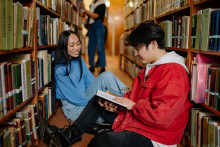China: FACTS & FIGURES
Structured interest of the UT since: 1980’s
Main focus: research collaboration, student recruitment
Other activities: student and staff exchange
Examples of partner institutions: University of Science and Technology of China (USTC), Northwestern Polytechnical University, Peking University
Development over the years:
|
China (number of students per year) |
2015/16 |
2016/17 |
2017/18 |
2018/19 (preliminary number) |
|
Enrolled (Master and Bachelor) students |
130 |
128 |
148 |
|
|
Influx of Bachelor students |
10 |
12 |
21 |
28 |
|
Influx of Master students |
67 |
66 |
75 |
34 |
People in charge: Louis Winnubst (country coordinator), Chang Zheng (UT’s China Representative)
‘Connections with Chinese institutes have always been driven by shared research interests,’ says Professor Louis Winnubst, the UT country coordinator for China and a visiting professor at the University of Science and Technology of China (USTC). ‘The official internationalization plan has existed for about two years, but our work with China goes much further back. From my side, I’ve had connections there for thirty years.’
China representative
There is one very direct connection between the UT and the Asian country: special representative Chang Zheng, an ITC alumnus based in his home country of China. Zheng explains why it’s beneficial for the university to have ‘someone in the field’: ‘In the past years, the UT has developed various joint education and research cooperation projects with Chinese partner universities, and new initiatives are always under discussion. Therefore, the role of China representative is important to keep track of existing cooperation, and provide tailor-made advice on new initiatives to the UT. Also, it reduces considerable travel costs.’
‘Chang Zheng provides the personal touch,’ adds Professor Winnubst. ‘He speaks Chinese and he is naturally familiar with both cultures, which makes it easier for him to communicate with everyone. He assists Chinese students who want to find out more about Twente, but he also helps us to deal with Chinese partners. Forming partnerships in China requires time. You can’t push. Which is why it’s good to have a personal contact directly there.’
China meets the Netherlands
Are there any other cultural differences that need to be taken into account when dealing with Chinese partners? ‘It’s very hard for me to pinpoint any differences,’ answers Winnubst. ‘I’ve supervised Chinese students for decades and have been going to China regularly for about fifteen years so I’m very familiar with the country and its customs. I’m therefore a bit too “Chinese” to answer that question.’
'It’s very hard for me to pinpoint any cultural differences'
Chang Zheng mentions a few differences. ‘Generally speaking, Dutch institutes operate based on a bottom-up approach and Chinese institutes have a top-down approach. The Dutch way is more direct and the Chinese way is more euphemistic. It’s my role to help the UT to have a good understanding and make the right judgement. It’s my task to provide more accurate interpretation of the issue at hand and to manage everyone’s expectations.’

Natural recruitment
The UT has proven popular especially with Chinese PhD candidates. The first Chinese PhD student graduated at the University of Twente already in 1994. The interest of Chinese students has only grown since. ‘After Germany, most foreign students come from China,’ says Winnubst. ‘Most of them come for their Master or PhD degree, some for an exchange stay, and they come to all UT faculties for various programmes.’ According to the country coordinator, the recruitment of these students happens rather naturally – through the UT’s research contacts in China.
'After Germany, most foreign students come from China'
Is there anything specific that attract these young Asians to Twente? ‘High level of education and research and cost-effectivity are always the main factors,’ answers Zheng. ‘The University of Twente has developed multiple joint education projects with Chinese partner universities, including double programmes, which also makes it is convenient for them, as they can combine the study in Twente with the study at their home universities.’
‘I believe they really appreciate our facilities and infrastructure,’ says Louis Winnubst. ‘On the other hand, not that many of our students go to China. In mainland China, language is an issue: there aren’t many English taught classes at the moment. Some UT students go there for internships and also for summer schools, however.’
Quality, not quantity
As the country coordinator repeats, the research and educational collaborations with Chinese partners are already strong. Would he like to get more universities and students on board in the future? ‘I’d like to make people aware of the existing contacts and form a good network. I don’t think we should go for higher numbers. Instead of quantity we should focus on quality.’
Winnubst’s Chinese colleague agrees: ‘The University of Twente is not well-known in China. However, most Chinese people can’t even name ten foreign universities,’ says Zheng. ‘In my opinion, the UT should not pay prior attention to its publicity, but should focus more on discipline excellence. Taking the ITC faculty as an example, through past 39 years cooperation in China, it is highly recognized in China and also worldwide for achievement in education, research and capacity development.’
STUDENT’S VOICE: ‘The Dutch community is closed off’
Jason Song (PhD student at the Inorganic Membranes group)
What made you decide to come study at the UT?
‘I did an internship at the UT during my Bachelor studies. After graduating, I knew I wanted to do my Master abroad and because I knew the UT already I decided to apply for a scholarship to study Chemical Engineering here. It was a rather clear choice for me. I liked the environment and I knew that language wasn’t an issue.’
What do you like and don’t like about studying at the UT?
‘I like that the international community here is quite active, it makes the environment colorful. The educational level is high and teachers here have very good language and teaching skills. What I don’t like is the location, we are quite far away from everything so travelling can be time-consuming. In the beginning, I experienced quite a culture shock. Everything was different: the climate, the food. The culture gap is very big but I was lucky. I had a fantastic group during the Kick-In, we became best friends and they guided me through everything. What I experienced is that there is a huge line between friends and acquaintances. The Dutch community is closed off, it’s hard to get into.’
Is there something the UT can do to get more Chinese students and/or to make it easier for them to study here?
‘I was a president of Unite and I saw that the Dutch and the international communities don’t merge. Dutch don’t really accept outsiders. That is in conflict with what the UT is promoting. The UT promotes itself as an international university but international students seem to be excluded from many things. The university could also help more international students to study Dutch because many want to learn but it’s hard for them to practice in the academic environment where everyone speaks English.’








